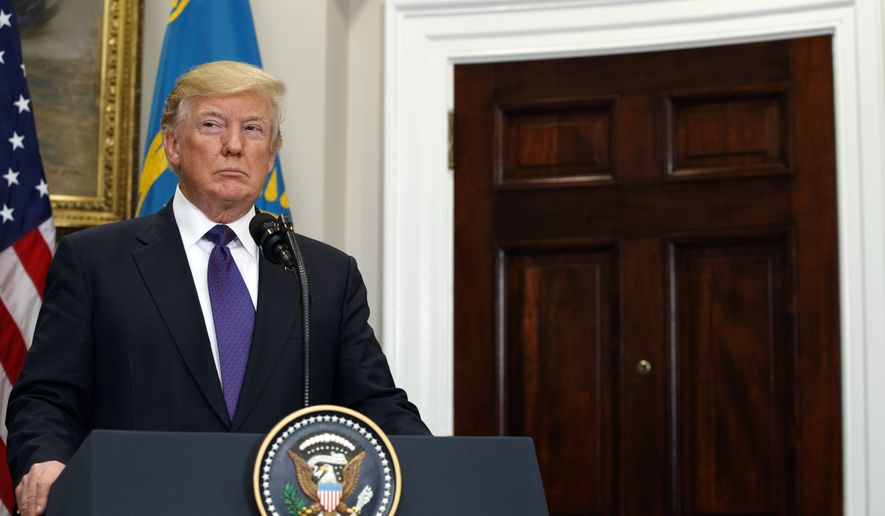The Justice Department said Tuesday it will appeal directly to the Supreme Court to approve President Trump’s decision to phase out the Obama-era Deferred Action for Childhood Arrivals deportation amnesty, hoping to cut corners and get the justices to quickly overturn a lower court’s ruling.
The rare move puts the justices on the spot, at a time when the fate of Dreamers is being heatedly debated in the Capitol, just across the street from the Supreme Court.
U.S. District Judge William Alsup threw a curveball at negotiators last week when he issued a series of rulings. He said then-candidate Donald Trump showed “racial animus” toward Mexicans during the 2016 campaign, and he said because most DACA recipients are Mexican, that tainted the Homeland Security Department’s decision last year to phase out the deportation amnesty.
Judge Alsup, who was appointed to the bench by President Clinton, also became the first judge to rule the 2012 DACA program itself legal.
Attorney General Jeff Sessions said Tuesday that Judge Alsup’s ruling “defies both law and common sense.”
“We are now taking the rare step of requesting direct review on the merits of this injunction by the Supreme Court so that this issue may be resolved quickly and fairly for all the parties involved,” he said in a statement announcing the speedy appeal.
Analysts said that such direct appeals, known in court-speak as “certiorari before judgment,” are rarely granted, but when they are, it’s usually in response to this type of Justice Department request.
Immigrant-rights group United We Dream, which advocates for some 690,000 illegal immigrant “Dreamers” protected by the DACA program, derided Mr. Sessions’ move as racist.
The American Civil Liberties Union called the direct appeal “the latest in a disturbing pattern of hostile actions directed at young immigrants across America.”
The DACA program has gotten twisted out of all recognition in recent months after the Trump administration announced last September it thought the program as established in 2012 was illegal, and began a six-month phase-out.
Judge Alsup said the Trump administration was wrong and DACA, established by executive action, was legal. But he said the Trump administration’s executive action to cancel it was illegal.
Critics have blasted the judge’s ruling as a muddle. On the one hand he used Mr. Trump’s campaign statements to rule the president had racial animus toward Mexicans, and since most DACA recipients are Mexican the phaseout was illegal — even though the phaseout was done by Homeland Security, not Mr. Trump.
At the same time, Judge Alsup ignored President Obama’s own repeated comments as president that DACA would be illegal — before Mr. Obama reversed himself ahead of the 2012 election, as he was seeking Hispanic votes.
Adding to the irony is that the chief plaintiff in the case against Mr. Trump is University of California President Janet Napolitano, who created the DACA program when she was Homeland Security secretary.
For now, Judge Alsup’s ruling remains in place. He ordered Homeland Security to restart DACA applications for the 690,000 people already protected by the program, saying they can apply for two-year renewals.
The government announced Saturday it would begin accepting those applications, even as it fights in court to cut the program off again.
Congress, meanwhile, is trying to come up with a more permanent solution for Dreamers, reaching for an agreement that would grant them citizenship rights in exchange for improvements to border security and other immigration policy.
• Stephen Dinan can be reached at sdinan@washingtontimes.com.




Please read our comment policy before commenting.